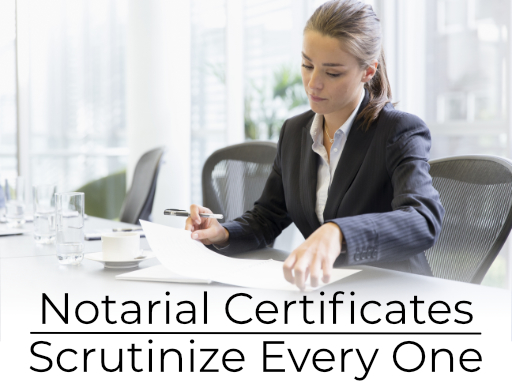Notary Public Underwriters Blog
Notarial Certificates – Scrutinize Every One!
- Details
- Published: April 27, 2021

As a commissioned or appointed notary public of your state, you own a lot of personal and professional responsibility every time you perform a notarial act.
One test of a notary’s will to exercise that responsibility relates to notarial certificates, particularly those appearing in a document prepared by respected professionals such as an attorney or paralegal.
Because the document was prepared by someone with legal expertise, the officiating notary might assume that the wording of the notarial certificate form is correct, it should not be changed, and therefore the notary need not worry about the certificate language at all.
Well… not so fast! The notary certainly should be concerned with the wording of every notarial certificate, no matter the circumstances of the document’s preparation.
As we’ve mentioned in a previous post, a notary public is solely responsible for ensuring that the wording of every notarial certificate the notary will complete fully complies with governing state law and (if applicable) administrative rules.
This means the notary must examine the certificate wording of every document presented for notarization, to verify that:
- The certificate clearly indicates a notarial act that the notary is authorized to perform. Overwhelmingly, the signature notarial acts most frequently performed by a notary are acknowledgments and verifications on oath or affirmation (jurats), indicated by wording such as “acknowledged before me…” or “sworn to or affirmed before me under penalty of perjury.” Those acts are authorized in every state, but a third signature notarial act—signature witnessing—is authorized only in some states. This less common act is indicated by wording such as “signed before me…” with no reference to an acknowledgment or oath/affirmation.
- The certificate contains no additional certifications that exceed the boundaries of the notary’s authorized duties. Some certificates will contain not only the familiar wording for a signature notarial act, but also additional statements in the certificate that would have the notary certifying certain facts or actions that are outside the formalities of notarization. This issue stems from a document preparer’s unfamiliarity with the actual scope of a notary’s duties.
- The certificate substantially or exactly reflects wording provided in laws and administrative rules of the notary’s commissioning state.* “Substantially” means that at a minimum, the wording of the document’s notarial certificate conveys the same information as the wording provided in statutes or administrative rules. Most states do not require this wording to perfectly mirror the statutory language, but some states specify exact wording or phrases. This is true particularly in states whose notaries might be notarizing for a physically present individual OR a remotely located individual appearing by means of audio-video communications technology (“remote online notarization”).
_______________
*This is especially important when the document was prepared in another state; the notarial language might conform to that state’s notary law, but not yours. - The certificate is not prefilled with incorrect information. A document preparer may not realize that notaries complete their notarial certificates contemporaneously with (at the same time as) performance of the notarial act, and that it is perfectly normal for the certificate blanks to remain unfilled until that time. Prefilled certificate blanks might contain a wrong venue, date of notarization or spelling of the principal signer’s name. Unless prohibited by law from doing so*, the notary may make necessary corrections** or strike through the entire prefilled certificate and provide a clean, new one.
_______________
*For example, Florida law prohibits a notary from changing anything in a document after it has been signed by anyone. (Remember that documents presented for an acknowledgment can be signed prior to notarization.)
**When correcting notarial certificate wording or information, never use white out or thick blackout lines. Always draw a single line through the incorrect information that clearly strikes that information, but enables it to still be read. Neatly print the correct information. Initial all corrections, and carefully note your actions in your record book (journal) entry.
So, never assume that a document preparer has included a notarial certificate that will satisfy all the requirements of your notary law and rules. Scrutinize every certificate on every document presented for notarization, and stay up to date on your state’s notary law and administrative rules. This will give you the knowledge and confidence to deal with issues like the ones we’ve shared today.
